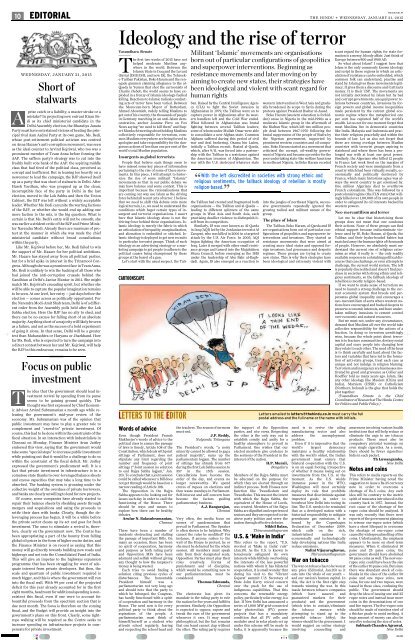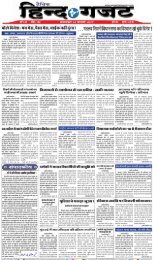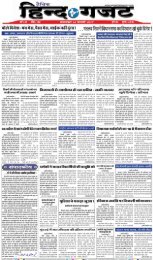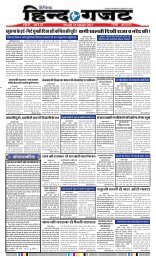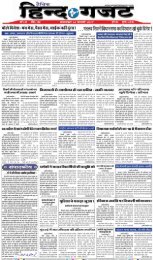You also want an ePaper? Increase the reach of your titles
YUMPU automatically turns print PDFs into web optimized ePapers that Google loves.
EDITORIAL<br />
NOIDA/DELHI<br />
10 THE HINDU WEDNESDAY, JANUARY 21, 2015<br />
Ideology and the rise of terror<br />
WEDNESDAY, JANUARY 21, 2015<br />
Short of<br />
stalwarts<br />
A<br />
prize catch or a liability, a master stroke or a<br />
mistake? In projecting new entrant Kiran Bedi<br />
as its chief ministerial candidate in the<br />
Delhi Assembly election, the Bharatiya Janata<br />
Party must have entertained visions of beating the principal<br />
rival Aam Aadmi Party at its own game. Ms. Bedi,<br />
whose post-retirement political activism was centred<br />
on Anna Hazare’s anti-corruption movement, was seen<br />
as the ideal counter to Arvind Kejriwal, who too was a<br />
prominent member of Team Anna before forming the<br />
AAP. The saffron party’s strategy was to cut into the<br />
freshly built vote bank of the AAP: the aspiring middle<br />
class that had tired of the political class, perceived as<br />
corrupt and inefficient. But in leaning too heavily on a<br />
newcomer to lead the campaign, the BJP showed itself<br />
up as a party that was short of stalwarts in Delhi. After<br />
Harsh Vardhan, who was propped up as the clean,<br />
incorruptible face of the party in Delhi in the last<br />
election, moved to the Lok Sabha and then the Union<br />
Cabinet, the BJP was left without a widely acceptable<br />
leader. Whether Ms. Bedi can unite the warring factions<br />
of the BJP, or whether she would end up adding one<br />
more faction to the mix, is the big question. What is<br />
certain is that Ms. Bedi’s entry will not be smooth; she<br />
was earlier a strident critic of the BJP and Prime Minister<br />
Narendra Modi. Already there are murmurs of protest<br />
at the manner in which she was made the chief<br />
ministerial candidate without broad consultations<br />
within the party.<br />
Like Mr. Kejriwal before her, Ms. Bedi failed to win<br />
the support of Mr. Hazare for her political ambitions.<br />
Mr. Hazare has stayed away from all political parties,<br />
but for a brief spike in interest in the Trinamool Congress.<br />
Although she was a prominent face in Team Anna,<br />
Ms. Bedi is unlikely to win the backing of all those who<br />
had joined the anti-corruption crusade behind the<br />
Gandhian at Delhi’s Jantar Mantar in 2011. She might<br />
match Mr. Kejriwal’s crusading spirit, but whether she<br />
will be able to capture the popular imagination remains<br />
to be seen. At one level, her entry — just days before the<br />
election — comes across as politically opportunist. For<br />
the Narendra Modi-Amit Shah team, Delhi is of a different<br />
order from the Assembly polls held after the Lok<br />
Sabha election. Here the BJP has no ally to shed, and<br />
there can be no excuse for falling short of an absolute<br />
majority. Anything short of a majority will likely be seen<br />
as a failure, and not as the success of a bold experiment<br />
of going it alone. In that sense, Delhi will be a greater<br />
test than Maharashtra or Haryana or Jharkhand. How<br />
far Ms. Bedi, who is expected to turn the campaign into<br />
a direct contest between her and Mr. Kejriwal, will help<br />
the BJP in this endeavour, remains to be seen.<br />
Focus on public<br />
investment<br />
T<br />
he idea that the government should lead investment<br />
revival by spending from its purse<br />
seems to be gaining ground quickly. The<br />
thought was first expressed by Chief Economic<br />
Adviser Arvind Subramanian a month ago while releasing<br />
the government’s mid-year review of the<br />
economy. Mr. Subramanian was of the opinion that<br />
public investment may have to play a greater role to<br />
complement and “crowd-in” private investment. Of<br />
course, this had to be done within the constraints of the<br />
fiscal situation. In an interaction with industrialists in<br />
Chennai on Monday, Finance Minister Arun Jaitley<br />
endorsed this view, saying that the government would<br />
take some “special steps” to increase public investment<br />
while pointing out that it would be a challenge to do so<br />
within the constraint of the fiscal deficit. Mr. Jaitley<br />
expressed the government’s predicament well. It is a<br />
fact that private investment in infrastructure is in a<br />
comatose state thanks to over-leveraged balance sheets<br />
and excess capacities that may take a long time to be<br />
absorbed. The banking system is groaning under the<br />
collective weight of the overdues of private borrowers,<br />
and banks are clearly unwilling to lend for new projects.<br />
Of course, some companies have already started to<br />
repair their balance sheets by shedding assets through<br />
mergers and acquisitions and using the proceeds to<br />
settle their dues with banks. Clearly, though the deleveraging<br />
process has begun, it will be a while before<br />
the private sector cleans up its act and goes for fresh<br />
investment. The onus to stimulate a revival is, therefore,<br />
clearly on the government now. The Centre has<br />
been appropriating a part of the bounty from falling<br />
global oil prices in the form of higher excise duties, and<br />
the Finance Minister is on record as saying that this<br />
money will go directly towards building new roads and<br />
highways and not into the Consolidated Fund of India.<br />
This will give an impetus to the highways expansion<br />
programme that has been struggling for want of adequate<br />
interest from private developers. But then, the<br />
scale and quantum of public investment required is<br />
much bigger, and this is where the government will run<br />
into the fiscal wall. With 99 per cent of the projected<br />
deficit for this year already accounted for in the first<br />
eight months, headroom for additional spending is nonexistent<br />
this fiscal, even if one were to account for<br />
bountiful proceeds from the spectrum auction that is<br />
due next month. The focus is therefore on the coming<br />
fiscal, and the Budget will provide an insight into the<br />
government’s plans on this front. Clearly, some tightrope<br />
walking will be required as the Centre seeks to<br />
increase spending on infrastructure projects to compensate<br />
for private investment.<br />
CM<br />
YK<br />
Vasundhara Sirnate<br />
The first two weeks of 2015 have not<br />
helped moderate Muslims anywhere<br />
in the world. Between the<br />
Islamic State in Iraq and the Levant<br />
(Syria) [ISIS/ISIL and now IS], the Tehreeke-Taliban<br />
Pakistan, Boko Haram and the renegade<br />
gunmen claiming allegiance to the al-<br />
Qaeda in Yemen that shot the cartoonists of<br />
Charlie Hebdo, the world seems to have exploded<br />
in a frenzy of Islamic ideology-fuelled<br />
killing. Reactions to Islamic radicals conducting<br />
acts of terror have been varied. Between<br />
the Moroccan-born Mayor of Rotterdam,<br />
Ahmed Aboutaleb, rudely telling Muslims to<br />
get out of his country, the thousands of people<br />
in Germany marching in an anti-Islam demonstration,<br />
anchor Jeanine Pirro on Fox<br />
News saying “we need to kill them” and Rupert<br />
Murdoch tweeting about holding Muslims<br />
collectively responsible for terrorism, common<br />
Muslims everywhere are being forced to<br />
apologise and take responsibility for the dangerous<br />
actions of less than one per cent of the<br />
world’s total Muslim population.<br />
CARTOONSCAPE<br />
LETTERS TO THE EDITOR<br />
Words of advice<br />
Even though President Pranab<br />
Mukherjee’s words of advice to the<br />
political class to ensure the passage<br />
of laws is timely, Article 108 of the<br />
Constitution, which deals with joint<br />
sittings of Parliament, does not<br />
stipulate any limit regarding the<br />
number and frequency of joint<br />
sittings (“‘Joint session no solution<br />
to end Rajya Sabha logjam,” Jan.<br />
20). To conclude that a joint session<br />
could be called whenever a Bill does<br />
not get through would be based on a<br />
narrow reading of Article 108.<br />
The Opposition in the Rajya<br />
Sabha appears to be looking out for<br />
issues each day in order to stall the<br />
functioning of the House. There<br />
should be ways and means to<br />
explore how there can be healthy<br />
debates.<br />
Arulur N. Balasubramanian,<br />
Chennai<br />
There have been a number of<br />
incidents obstructing and stalling<br />
the passage of important Bills. On<br />
many an occasion, there has been<br />
no spirit of cooperation, harmony<br />
and purpose as both ruling party<br />
and Opposition MPs have been<br />
adamant and selfish without giving<br />
any thought to how the taxpayer’s<br />
money is being wasted.<br />
Each tries to avoid finding a<br />
solution citing previous cycles of<br />
disturbances. The honourable<br />
President himself was a<br />
parliamentarian not very long ago<br />
and should note that the party to<br />
which he belonged, the Congress,<br />
has hardly functioned with a spirit<br />
of cooperation and harmony in the<br />
House. The need now is for every<br />
political party to think about the<br />
aspirations of the people. A<br />
parliamentarian must think of<br />
himself/herself as a student who<br />
attends school regularly, fearing<br />
and respecting the school head and<br />
Militant ‘Islamic’ movements are organisations<br />
born out of particular configurations of geopolitics<br />
and superpower interventions. Beginning as<br />
resistance movements and later moving on by<br />
aiming to create new states, their strategies have<br />
been ideological and violent with scant regard for<br />
human rights<br />
Insurgents as global terrorists<br />
People that believe such things seem to<br />
have missed some key pieces of information<br />
pertaining to the rise of some of these movements.<br />
In this piece, I will attempt to historicise<br />
the rise of some militant “Islamic”<br />
movements so that in our public debate we<br />
may have balance and some context. This is<br />
important because the rationalisations that<br />
are coming our way use Islam as the driving<br />
force behind all recent acts of terror. I believe<br />
that we need to shift this debate onto more<br />
logical terrain, i.e., we need to understand the<br />
conditions which beget certain types of insurgent<br />
and terrorist organisations. I assert<br />
here that Islamic ideology alone is not the<br />
driving force behind these organisations. Islamic<br />
ideology is merely the fabric in which<br />
an articulation of inequality, marginalisation,<br />
and alienation is embedded or stitched. Islamic<br />
ideology is deployed to get new recruits<br />
to particular terrorist groups. Think of such<br />
ideology as an advertising strategy or a marketing<br />
campaign to get people to adhere to the<br />
political causes being championed by these<br />
groups at the barrel of a gun.<br />
Let’s start with the usual suspect, the Taliban.<br />
Raised by the Central Intelligence Agency<br />
(CIA) to fight the Soviet invasion in<br />
Afghanistan in 1979, the Taliban went on to<br />
capture power in Afghanistan after its western<br />
handlers left and the Cold War ended.<br />
What followed in Afghanistan was brutal<br />
fighting between several Taliban leaders;<br />
some of whom under Mullah Omar were able<br />
to consolidate a new Afghan state. Common<br />
Afghans suffered during this period of civil<br />
war and deal brokering. Osama bin Laden,<br />
initially a Taliban recruit, floated al-Qaeda,<br />
which, after 9/11, was forced into a partnership<br />
with the Taliban in a resistance against<br />
the American invasion of Afghanistan. The<br />
war with the U.S. destroyed whatever state<br />
the Taliban had created and fragmented both<br />
organisations — the Taliban and al-Qaeda —<br />
leading to different splinters of the same<br />
groups in West Asia and South Asia, each<br />
practising deadlier violence to distinguish itself<br />
from its competitors.<br />
Similarly, IS was once known as Al-Qaeda<br />
in Iraq (AQI) led by the Jordanian terrorist Al<br />
Zarqawi, who was killed in 2006 in a targeted<br />
attack by the U.S. Air Force. In 2003, AQI<br />
began fighting the American occupation of<br />
Iraq. Later it merged with other small resistance<br />
groups and turned into the Mujahideen<br />
Shura Council, before emerging as the ISIS<br />
under the leadership of Abu Bakr al-Baghdadi.<br />
Again, IS also emerged as a reaction to<br />
western intervention in West Asia and gradually<br />
broadened its scope to Syria during the<br />
protests against President Bashar al-Assad.<br />
Boko Haram (western education is forbidden)<br />
arose in Nigeria in the mid-1990s as a<br />
moderate Islamic group in the aftermath of<br />
the Biafran War, which left two million people<br />
dead between 1967-1970 following the<br />
brutal suppression of the people of Biafra by<br />
the Nigerian government, supported by<br />
prominent western countries and oil companies.<br />
Boko Haram started as a movement that<br />
criticised the corrupt, oil-wealthy government<br />
of Nigeria and became a provider for the<br />
poor undertaking state-like welfare functions<br />
in northeast Nigeria. As Boko Haram receded<br />
“<br />
With the left discredited in societies with strong ethnic and<br />
religious sentiments, the fallback ideology of rebellion is mostly<br />
religion-based.<br />
”<br />
the teachers. The season of sermons<br />
must end.<br />
J.P. Reddy,<br />
Nalgonda, Telangana<br />
The President’s words, “a noisy<br />
minority cannot be allowed to gag a<br />
patient majority”, sums up the<br />
parliamentary logjam. The number<br />
of sittings has shrunk from 677<br />
during the first Lok Sabha session to<br />
357 in the 15th session.<br />
Cancellations have become the<br />
order of the day, and events no<br />
longer newsworthy. We spend<br />
crores of rupees on elections and<br />
then waste mandays in Parliament.<br />
Self-interest and self-concern have<br />
become the factors guiding<br />
parliamentary business.<br />
A.J. Rangarajan,<br />
Chennai<br />
Very often, the media focus on<br />
scenes of pandemonium that<br />
prevail in Parliament. The Speaker<br />
is often shown to be helpless. Why<br />
cannot the rules be modified? For<br />
instance, if anyone rushes to the<br />
well of the House to protest, he or<br />
she must be debarred for the whole<br />
session. All members must speak<br />
only from their designated seats.<br />
Opposition Parties must play their<br />
roles creatively. Forms of<br />
punishment and of discipline,<br />
which would be something new to<br />
our parliamentarians, must be<br />
considered.<br />
Thomas Edmunds,<br />
Chennai<br />
The electorate has given its<br />
mandate to the ruling party to rule<br />
the nation for five years and fulfil its<br />
promises. Similarly, the Opposition<br />
is expected to oppose, expose and<br />
tweak the ears of the government<br />
whenever it errs. It may sound<br />
philosophical, but the fact remains<br />
that one hand cannot clap without<br />
the other. The ruling party requires<br />
the support of the Opposition<br />
parties, and vice versa. Respecting<br />
the other is the only way out to<br />
establish comity and amity for a<br />
healthy atmosphere to prevail in<br />
Parliament. One wishes that our<br />
elected members give credence to<br />
the sermons of the President in the<br />
interest of the nation.<br />
H.P. Murali,<br />
Bengaluru<br />
Members of the Rajya Sabha must<br />
be educated on the purpose for<br />
which they are elected through an<br />
indirect process. Both Houses now<br />
function like Tweedledum and<br />
Tweedledee. This was not the intent<br />
with which the Rajya Sabha, the<br />
equivalent of the House of Lords,<br />
was created. Members of the Rajya<br />
Sabha are dignified and experienced<br />
seniors and they are expected to rise<br />
above party politics and serve the<br />
nation through effective debates.<br />
Nikhil Balan,<br />
Thiruvananthapuram<br />
U.S. & ‘Make in India’<br />
This refers to the report, “U.S.<br />
worried at ‘Make in India’ rule”<br />
(Jan.19). As the U.S. is known to<br />
tenaciously safeguard its own<br />
interests while blithely overlooking<br />
the interests of the less powerful<br />
nations with whom it has bilateral<br />
cooperation, it is small wonder that<br />
during his visit to the ‘Vibrant<br />
Gujarat’ summit U.S. Secretary of<br />
State John Kerry voiced concern<br />
over the push for the use of<br />
indigenous capabilities. That this<br />
concerns the renewable energy<br />
policy, particularly solar energy, is a<br />
fact. If New Delhi has announced a<br />
series of 1,000 MW grid-connected<br />
solar photovoltaic (PV) power<br />
projects that has a mandatory<br />
condition that all PV cells and<br />
modules used in solar plants set up<br />
under this scheme will be made in<br />
India, it is apparently because the<br />
into the jungles of northeast Nigeria, successive<br />
governments repeatedly ignored the<br />
growing radical and militant nature of the<br />
group.<br />
The place of Islam<br />
The Taliban, Boko Haram, al-Qaeda and IS<br />
are organisations born out of particular configurations<br />
of geopolitics and superpower interventions<br />
and invasions. They started as<br />
resistance movements that were aimed at<br />
creating more ideal states and opposed foreign<br />
invasions, bad governance and despotic<br />
regimes. These groups are trying to create<br />
new states. This is why their strategies have<br />
been ideological and extremely violent with<br />
Letters emailed to letters@thehindu.co.in must carry the full<br />
postal address and the full name or the name with initials.<br />
need is to revive the ailing<br />
manufacturing sector and also<br />
address the unemployment<br />
problem.<br />
Even if it is imperative that the<br />
world’s largest democracy<br />
maintains a healthy relationship<br />
with the world’s oldest, the Indian<br />
government must ensure that<br />
bilateral cooperation with the U.S.<br />
is on an equal footing, irrespective<br />
of whether it means losing out on<br />
investments from the U.S. at the<br />
moment. As the U.S. wields<br />
immense power in the WTO,<br />
Washington will most certainly<br />
deploy its rule that prohibits<br />
measures that discriminate against<br />
imported goods in order to<br />
browbeat New Delhi into toeing its<br />
line. The U.S. needs to be reminded<br />
that as a developed nation with a<br />
historical responsibility to mitigate<br />
greenhouse gas emissions, it is<br />
bound by the Copenhagen<br />
Declaration of December 2009,<br />
which calls on the rich,<br />
industrialised nations to<br />
economically and technologically<br />
help developing nations like India<br />
reduce emissions.<br />
Nalini Vijayaraghavan,<br />
Thiruvananthapuram<br />
War on tobacco<br />
The war on tobacco has to be won at<br />
any price (Editorial, Jan.20) as it<br />
eats into the vitals of our youth —<br />
and our nation’s human capital. In<br />
this, the Act is the first right step<br />
towards winning the war. In this<br />
tussle between tobacco companies<br />
(which have assured and<br />
guaranteed markets for their<br />
products) and the government<br />
(which tries to contain/eliminate<br />
the tobacco menace while<br />
attempting to stand up to the<br />
powerful tobacco lobby), the<br />
winner should be the government. I<br />
would suggest an online strategy<br />
involving counselling and<br />
scant regard for human rights; for state formation<br />
is a messy, bloody affair. Just think of<br />
Europe between 900 and 1900 AD.<br />
So what about Islam? I suggest here that<br />
Islam is the only commonly known ideology<br />
and script in these regions in which an articulation<br />
of resistance can be embedded, which<br />
common folk can understand, practise and<br />
stand by. Islam gives these movements legitimacy.<br />
It gives them a discourse and it attracts<br />
money. It is their USP. The movements are<br />
not initially motivated by Islam but by bad<br />
and corrupt governments, unequal power relations<br />
between countries, invasions by foreign<br />
powers and global income inequalities<br />
made persistent by the current global economic<br />
regime where the metaphorical one<br />
per cent has captured half of the world’s<br />
wealth. Let us not for one moment forget that<br />
most Muslims live in democratic countries<br />
like India, Malaysia and Indonesia and practise<br />
their religions peacefully and within the<br />
bounds of law. Let us also not forget that<br />
there are strong overlaps between Muslim<br />
countries with terrorist groups aspiring to<br />
statehood and where there has been a prolonged<br />
war with at least one great power.<br />
Similarly, the Algerians who killed 12 people<br />
in France last week lived on the margins of<br />
French society and were immigrants from a<br />
country which had been virtually socially, economically<br />
and politically destroyed by<br />
France, which many historians agree was always<br />
the worst country to get colonised by.<br />
One million Algerians died to overthrow<br />
French colonialism. This was followed by a<br />
postcolonial regime (the FLN state) that willingly<br />
killed over 1,00,000 of its own people in<br />
order to safeguard its oil interests backed by<br />
western powers.<br />
Neo-mercantilism and terror<br />
Let me be clear that historicising these<br />
groups does not mean that one condones<br />
their actions. None of these groups can find<br />
ethical support because indiscriminate violence<br />
used by IS, Boko Haram, al-Qaeda, the<br />
Taliban and their hydra-headed babies has<br />
snatched away the human rights of thousands<br />
of people. However, we absolutely must understand<br />
the current rise of religious extremism<br />
as what it really is — the only readily<br />
available response in a shrinking political discourse<br />
that can challenge, or even attempts to<br />
challenge, the current world system. The left<br />
is popularly discredited and doesn’t find purchase<br />
in societies with strong ethnic and religious<br />
sentiments, so the fallback ideology of<br />
rebellion is mostly religion-based.<br />
If we want to make sense of terrorism we<br />
need to launch a strong challenge to the current<br />
economic system that breeds and perpetuates<br />
global inequality and encourages a<br />
neo-mercantilism of sorts where western nations<br />
have encouraged and backed despots to<br />
preserve economic interests, and have undertaken<br />
military invasions to cement control<br />
over economic and natural resources.<br />
But we must not, under any circumstance,<br />
demand that Muslims all over the world take<br />
collective responsibility for the actions of a<br />
fraction. In doing so terrorism unwittingly<br />
wins, because the whole point about terrorism<br />
is to fracture communities, destroy social<br />
capital and scare people into changing how<br />
they relate to each other. The need of the hour<br />
is to think carefully and hard about the factors<br />
and variables that have led to the formation<br />
of anti-state groups, treat each case as<br />
unique and not indulge in religion blaming.<br />
Terrorism and insurgency are businesses motivated<br />
by greed and grievance as Collier and<br />
Hoeffler told us many years ago. Islam, like<br />
any other ideology like Maoism (China and<br />
India), Marxism (USSR) or Catholicism<br />
(Northern Ireland) is the glue that holds the<br />
plot together.<br />
(Vasundhara Sirnate is the Chief<br />
Coordinator of Research at The Hindu Centre<br />
for Politics and Public Policy.)<br />
awareness involving various health<br />
institutions that will help reduce or<br />
eliminate the urge to use tobacco<br />
products. There must also be<br />
compulsory pictorial warnings on<br />
even single cigarettes. As a norm,<br />
there should be fewer cigarettes/<br />
bidis in each packet.<br />
Th Luwangamba,<br />
New Delhi<br />
Notes and coins<br />
This refers to media reports on the<br />
Prime Minister having noted the<br />
suggestion to issue a Rs.25 currency<br />
note in order to overcome a<br />
shortage of Rs.5 coins. Any such<br />
idea will be contrary to the metric<br />
spirit of measures introduced in the<br />
country back in 1957. Instead, the<br />
root cause of the shortage of five<br />
rupee coins should be analysed. It<br />
was only recently that there were<br />
reports of the government planning<br />
to reissue one-rupee notes (which<br />
have a short lifespan) to overcome<br />
the shortage of one-rupee coins<br />
caused by widespread melting of the<br />
coins. Unfortunately, the emphasis<br />
appears to be more on short-term<br />
measures. When it eliminated 10<br />
paise and 25 paise coins, the<br />
government should have abolished<br />
50 paise coins as well. The new onerupee<br />
coin could have been the size<br />
of the earlier 10 paise coin. But since<br />
there was abundant stock of coinblanks<br />
in the sizes of the earlier 50<br />
paise and one rupee coins, new<br />
coins, for one and two rupees, were<br />
issued in these sizes, confusing the<br />
public. The government should<br />
drop the idea of issuing one and 25<br />
rupee notes and instead issue more<br />
coins in the denominations of one<br />
and five rupees. The five-rupee coin<br />
should be made of stainless steel of<br />
a thicker grade to avoid melting. A<br />
huge amount of money can also be<br />
saved by reducing the size of notes.<br />
Subhash Chandra Agrawal,<br />
New Delhi<br />
ND-ND


